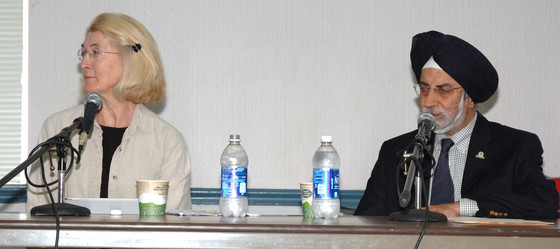Satyendra Huja, mayor of the City of Charlottesville and Ann Mallek, chairman of the Albemarle County Board of Supervisors spoke at the Wednesday, May 8, 2013 meeting of the Senior Statesmen of Virginia. The meeting was held at The Senior Center in Charlottesville. Following opening remarks by the participants questions were taken from the audience. The program was moderated by SSV President Sue Liberman.


Satyendra Huja is the president of Community Planning Associates, and is also adjunct faculty at the University of Virginia School of Architecture and teaches Urban Planning courses on a regular basis. He was director of Strategic Planning for the City of Charlottesville from 1998 to 2004. Prior to that he was director of Planning and Community Development for the City of Charlottesville for 25 years. He received his Masters Degree in Urban Planning from Michigan State University.
He was elected to the Charlottesville City Council in 2007 and is currently serving as mayor. His experiences are in the area of downtown revitalization, housing, historic preservation, transportation planning, art and culture activities, and neighborhood revitalization.
He has received honors from the Virginia Society of American Institute of Architects, recognition from the PEW Foundation for downtown revitalization, and a special recognition award from Piedmont Council for the Arts for his outstanding contribution and support for the arts. He also has been a consultant to the City of Pleven, Bulgaria, for Economic Development and Tourism Marketing.

Ann H. Mallek, chairman of the Albemarle County Board of Supervisors, represents the White Hall District. She is an educator and program coordinator for Central Virginia for the Virginia Museum of Natural History. She received her B.A. in Zoology from Connecticut College, New London CT.
Ms. Mallek was elected to the Board in January 2008 and is currently serving as chairman. She serves on the following standing committees: Thomas Jefferson Planning District Commission; Piedmont Workforce Network Council; Acquisition of Conservation Easements; Property Committee; Rivanna River Basin Commission; Charlottesville/Albemarle/UVA Planning and Coordination Council Policy Committee; LEAP Governance Board; CIP Oversight Committee; and the Crozet Community Advisory Council.
She is a member of the following organizations: League of Women Voters; Albemarle County Farm Bureau; Charlottesville-Albemarle Chamber of Commerce; Piedmont Environmental Council; Southern Environmental Law Center; Rivanna Conservation Society; Ivy Creek Foundation and the League of Conservation Voters.

The great divide Unlike almost every other state, in Virginia cities and counties are completely separate entities. The downside of that arrangement is that regional issues can involve many players. The upside is that citizens, by their choice of residence within the same general area, get to “choose” between two different governments. Charlottesville Charlottesville operates under the “council-manager” form of government that grew out of a national mid-century reform movement to stop patronage and align government with the business model of an elected board of trustees ( City Council ), which hires a CEO (the city manager ) who is insulated from the political rough and tumble. The mayor has no special powers (but earns $16,000 for the position) and is simply the member of City Council who sets the agenda (and cuts a lot of ribbons). In recent years, there’s some buzz about having the mayor directly elected by citizens rather than by fellow councilors, who all get $14,000 annually and are all officially part-timers.